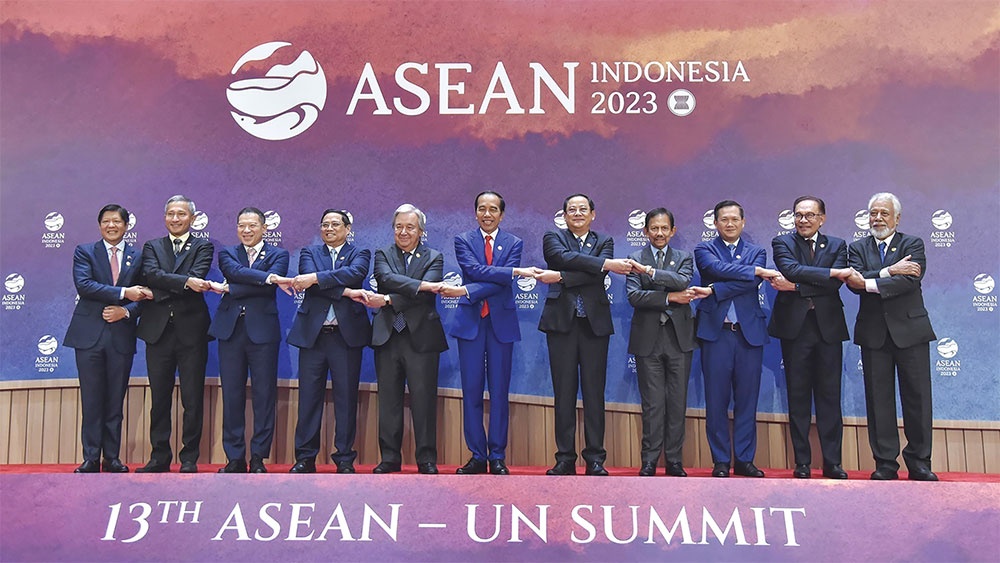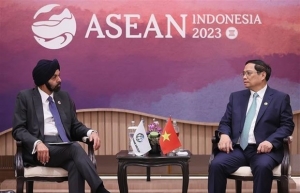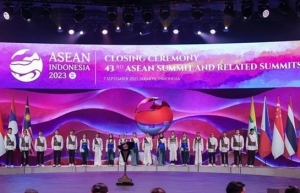No more business as usual within ASEAN
 |
| ASEAN members want to promote the bloc as a true centre for economic growth, photo VNA |
At the 43rd ASEAN Summit and Related Summits in Indonesia last week, member nations’ leaders said that they recognised the need for the ASEAN economy to go beyond business as usual to boost productivity to compete and thrive in a rapidly evolving global environment.
“We will elevate our economic community by enhancing ASEAN’s attractiveness as a sustainable investment destination, promoting scientific and technological research, stimulating innovation and digital technology, responding to the rapidly changing labour markets as we march towards our green economy agenda, and proactively revitalising skills development to meet the needs of the future industry and create job opportunities for ASEAN citizens,” said the ASEAN leaders’ declaration on growth, released on September 5.
The region’s leaders have tasked economic ministers with future-proofing the ASEAN Economic Community, including through enhancing investment policies, strengthening investment protection, as well as ensuring transparency and certainty of investment laws and regulations, and promoting convergence in competition policy.
Late last year, member states agreed to adopt a holistic approach to building a competitive investment climate, which will allow them to lure in more foreign direct investment (FDI) within the bloc and from its five partners of China, Japan, South Korea, Australia, and New Zealand.
Investment facilitation should cover business registration and approvals, licences, and other administrative requirements and processes, and tax-related and social security procedures, for example.
“To keep ASEAN as a centre of economic growth worldwide, it must boost its economic links, expand the intra-bloc market, and unleash trade and investment flows,” said Vietnam’s Prime Minister Pham Minh Chinh. “ASEAN member states need to remove obstructions on policies and institutions, while maintaining stable intra-bloc supply chains to improve the region’s resilience against global challenges.”
Vietnam is committed to continue improving its business and investment climate for all investors, and also wants partners to facilitate Vietnamese goods to enter regional markets, according to PM Chinh.
Advantages from free trade agreements like the Regional Comprehensive Economic Partnership (RCEP) must also be maximised for trade and investment.
According to the ASEAN Secretariat, investment facilitation will be leveraged by advantages from the RCEP. Under the RCEP’s commitments, member states pledged to erase up to 98 per cent of tariff lines for Vietnam, and ASEAN countries pledged to do that with up to 100 per cent of tariffs. The longest roadmap for tariff elimination is 15-20 years after the deal entered into force.
“The RCEP will help enterprises to expand markets, and develop production chains and value chains, with harmonised regulations on origins, tariff and customs procedures, quarantine, and technical standards,” PM Chinh said. “Moreover, the member states need to effectively carry out the ASEAN Master Plan on Industry 4.0 and the ASEAN Agreement on Electronic Commerce, which can strongly help boost digital transformation, attract FDI, and facilitate regional connectivity and economic recovery.”
The ASEAN Secretariat appreciates the investment facilitation in Vietnam, which it said has great potential to bring in more FDI both inside and outside ASEAN.
“The investment environment in Vietnam has improved over the years, as corroborated by survey findings from foreign chambers of commerce based in the country,” the secretariat said. “The government has introduced measures to simplify requirements, reduce steps, and streamline processes to facilitate investment.”
The Vietnamese government has continued to reform and take steps to improve the country’s investment environment, including implementing regulatory directives on strengthening information provision, and simplifying processes.
For example, the existing Law on Investment covers Vietnam’s efforts to draw in FDI, including in certain activities such as university education, pollution mitigation, and medical research. It also addresses investment incentives. Additional 2021 guidance for the law highlights efforts in creating an open mechanism, overcoming bottlenecks in investment and business; strengthening decentralisation; ensuring transparency; and providing additional incentives and special investment support.
Moreover, the Law on Public-Private Partnership Investment prioritises key industries such as transport, electricity, irrigation, water supply and treatment, healthcare, and IT infrastructure.
According to the Ministry of Planning and Investment, as of August 20, ASEAN nations have poured a great deal into Vietnam, including Singapore with the total registered capital of about $72.7 billion, followed by Thailand at $13.6 billion, Malaysia at $13 billion, and Brunei with $949.8 million. Investment from some of the bloc’s partner countries is also huge, with the registered investment from South Korea at $83 billion, Japan with $71 billion, China at $26 billion, and Australia at $2 billion.
 | Prime Minister meets World Bank President in Indonesia Prime Minister Pham Minh Chinh on September 7 received World Bank (WB) President Ajay Banga in Jakarta on the sideline of the 43rd ASEAN Summit and related meetings in Indonesia. |
 | 43rd ASEAN Summit concludes in Indonesia The 43rd ASEAN Summit and related summits wrapped up in Jakarta, Indonesia on September 7 afternoon. |
What the stars mean:
★ Poor ★ ★ Promising ★★★ Good ★★★★ Very good ★★★★★ Exceptional
Related Contents
Latest News
More News
- Vietnam shifts into new real estate cycle (February 26, 2026 | 08:00)
- Citi report finds global trade transformed by tariffs and AI (February 25, 2026 | 10:49)
- SK Innovation-led consortium wins $2.3 billion LNG project in Nghe An (February 25, 2026 | 07:56)
- South Korean VC completes buyout of Chicken Plus Vietnam (February 25, 2026 | 07:55)
- THACO opens $70 million manufacturing complex in Danang (February 25, 2026 | 07:54)
- Vietnam’s new construction regulations shift accountability in real estate (February 25, 2026 | 07:51)
- Masan Consumer names new deputy CEO to drive foods and beverages growth (February 23, 2026 | 20:52)
- E-vehicle infrastructure financing for high growth (February 20, 2026 | 15:09)
- Myriad risks ahead, but ones Vietnam can confront (February 20, 2026 | 15:02)
- Economic factors and themes to be mindful of (February 20, 2026 | 14:55)

 Tag:
Tag:












 Mobile Version
Mobile Version